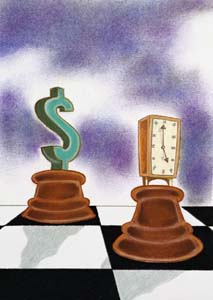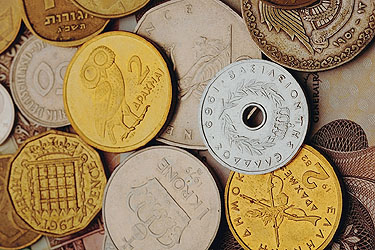|
 Investing should not be based upon greed, but should make us good stewards of the Earth's goods that God gives us.
Investing should not be based upon greed, but should make us good stewards of the Earth's goods that God gives us.- Pray before Investing your money.
- Avoid borrowing money as much as possible. Buy a house with a fixed rate mortgage, but put a substantial amount of money for down payment. Never buy investments, such as stocks by borrowing. Note that your home is an investment, so choose a good house in a good location. In addition, avoid time sharing because most are over priced.

- Rules of good Investments:
1. Invest for the long term.
2. Do not put all your money in investments with a large amount of risk.
3. Buy stocks or stock mutual funds on a semi-regular basis, so that you take advantage of dollar average buying (buying by dollar amount instead of buying by the number of shares). This is sometimes difficult to do because stocks are usually bought in units of 100 shares.
4. Don't panic by selling if the market suddently goes down or if there is a crash.
5. Diversify your investments, especially with stocks so that you are not completely dependent on one or several companies performance.
6. Don't invest in companies that promote Abortion or Gambling. Note that Abortion is killing the unborn child and is very evil. Gambling is not good because some people can become addicted to it, and lose a lot of money; therefore don't support it.
7. Don't invest in Derivatives or in companies whose fundamentals don't support the stock's price.
- To have your investment grow faster, avoid taxes where possible.
Use IRA's and put a substantial amount of money in your 401K where you work on a regular basis. Make sure that you buy stock in the company that you work for, if your company is in sound financial condition.

Choose stocks in companies that you like their products or services, and which have good financial strength (check the company's performance at a library or through a financial publication)


Pension Plans are very important. Defined Benefit plans are in most cases, much better than cash value plans. Be sure you know how much pension you are entitled to. If your pension plan at work is not the best, contribute more money to your 401K savings plan. Remember to plan for retirement at an earily age!!! Moreover, the ultimate goal of retirement planning is to make sure your assets last as long as you live.
Be careful about buying stocks that have a high P/E ratio (price/earnings ratio). Make sure that the company's strength justifies the high price of this type of stock. Often quoted P/E ratios are based on future earnings. If those future earnings aren't there, the price of this type of stock will drop. Consequently, when you buy stocks, it is best to diversify both in stocks of different companies and stocks of companies in different industries or categories. Remember to invest for the long term.
The best time to buy a stock is after the price of the particular stock has declined. Set a resonable price target, and when the price decreases to below your target, then buy it. Unfortunately, you may have to wait a long time, or you may never get the opportunity. Nevertheless, buying on a regular basis is another way at approaching the stock market (dollar average buying). Remember that good stock mutual funds may reduce the risk.
In the future, remember that you can not count on high returns from stocks. Consequently, it is best to expect moderate returns from stocks of strong companies. In addition, dividend paying stocks are an indication of a stock with substantial earnings year after year.


How are you doing financially?
Calculate the Average Net Worth = Your age X Your Annual Salary divided by 10.
Note: It is best to use your highest Annual Salary for this calculation.
If your Net Worth > 2 X Average Net Worth, score an A.
If your Net Worth < Average Net Worth, then you need to improve; spend less money, save more money, and choose good investments (be sure to utilize a 401K plan at work).
If your Net worth is less than 2 X Average Net Worth, but greater than 1.5 X Average Net Worth, score a B. Also, it is best to delay retirement until you score an A or close to an A. At age 65, delay retirement if you have not saved up at least 11 times your highest Annual Salary.

Being in good financial health, also helps to keep you in better physical health. Please see the page on stress relief. May God bless you and your family.

 The only cycles that occur all the time, are asssociated with the presidental election period of 4 years. Stocks tend to rise consistently in the year preceeding the presidental election. Other longer term cycles are most likely multiples of this 4 year period. This still supports investing for the long term; however, it may be best to buy at the beginning of the 3rd year. Remember not to invest in many companies that have high P/E ratios; these companies may tank later unless profits keep rising.
The only cycles that occur all the time, are asssociated with the presidental election period of 4 years. Stocks tend to rise consistently in the year preceeding the presidental election. Other longer term cycles are most likely multiples of this 4 year period. This still supports investing for the long term; however, it may be best to buy at the beginning of the 3rd year. Remember not to invest in many companies that have high P/E ratios; these companies may tank later unless profits keep rising.

Need more income to meet your financial goals?
Consider selling covered calls when the stock market or a particular stock is moving sideways. You earn the premium from selling the call, and the chance that someone may redeem the call and take your stock shares is low. Note: this does not apply when the stock market is moving upward. Warning: make sure that the stock market and the particular stock is moving sideways. Financial and political uncertainty is not the time to take on any risk.


Do not close your 401K account when you leave or retire from your company. If you want to roll over the 401K money to an IRA, make sure that you choose the same investment categories, such as the same types of mutual funds. Do not cash out a portion of your 401K money after you leave the company. Your 401K account is a very important investment that will help to provide enough money for your retirement years. Moreover, you may live to a very old age, so it is important not to run out of money in the final years. Furthermore, just before retirement, you should increase your contribution to your 401K plan. In addition, new employees need to start a 401K account as soon as possible.

Investing in coins, real estate, or art can be risky unless you know the field. Real estate runs in cycles, and holding property means paying taxes on the property each year. You must know which type of rare coins will increase in value. Art can be very risky, since some art will become worthless. When investing in coins, real estate, or art, put only a portion of your money in this type of investment.

Your Home is an investment. Obtain a fixed rate mortgage and put a substantial amount as down payment. Make sure that you can make mortgage payments on time no matter what happens. Pay off other debts after your mortgage, and delay buying a vehicle after you move into your new home (if you can't afford another major purchase). Also do not borrow money on the equity in your home.

In times of economic crisis
Do not panic by selling off your stocks or converting stocks into cash or bonds in your 401K. A market crash presents an opportunity to buy stocks at very low prices. Buying dividend paying stocks in strong companies is an excellent stradegy in uncertant times. Always invest for the long term, and ride out the dips. Treasury investments have the lowest risk, and it is good to have a portion of your money in Treasuries. Remember to pray before your make a financial decision.

In Times of Economic Crisis
It is a good idea to delay retirement. Don't retire until your full social security retirement date or later if you have suffered losses in your investments. Retire only after you have paid off the mortgage on your home. If you are able, work in your 70's.
It is important to note that your social security benefit increases each year that you delay retirement until age 70. It is smart to start receiving social security benefits at age 70. Plan to live into your 90's --- so save for retirement when you are in your 30's, 40's, 50's, and 60's.


Avoid all scams
Examine all transactions very carefully. Anything that seems too good to be true is suspect. Guard your personal information. Think about what you are signing.


Save at least 15% each year for a secure future!!!
Invest the money that you save wisely. Avoid high risk investments.
Invest the money in securities that increase in value over time. Be careful.
Use the 4% rule when you retire. Do not take more than 4% per year from your investments when you retire.
Also delay collecting social security until you are 70 years old to receive the maximum benefit; like 80% more than what you would receive if you started at age 62.

How to use a Gift or Tax Cut or part of a Raise
Any extra money that you receive is best to be invested instead of spending on luxuries. You always need to save for retirement or a rainy day.
Invest extra money into a 401K plan at work or into dividend paying stocks. Later in life, you will be glad that you did. Resist the spending instinct.

Be strong financially. Invest wisely and avoid high risk. Constantly study investments, such as stocks, mutual funds, and municipal bonds. Listen to advisers, but be careful because some advice may not be productive. Do not fall for scams and think for yourself.

The common formula for financial independence is savings of at least 25 times your annual living expenses. Your annual living expenses must include taxes, depreciation on cars and homes, contributions, and insurance. Do not count the value of your home and emergency money into the savings amount. It good to achieve this when you retire. Being strong financially reduces a lot of worry. Give glory to God for your financial strength.



Over the long term, stocks out perform bonds, cash, etc. Invest for the long term. Buy stocks or buy mutual funds. Do not buy and sell stocks too often, especially if the market changes. Low risk stocks are dividend paying stocks, and the dividend paying stocks that increase their dividend each year are best.
Strong dividend paying stocks are utilities. Utilities get rate increases; consequently, it is wise to take advantage of this when buying dividend paying stocks. However, make sure the utility stock that you select, has not cut its dividend in the past. Also be sure to diversify, so that one bad stock will not cause any panic. Think for the future, retirement needs, and a happy and good life.



401K
Be sure to put money into a 401K each month where you work. Select various mutual funds that will grow your assets. Include large cap, medium cap, and small cap stock funds. Also include foreign investments. Invest 5% to 15% of you pay. Remember that the money invested is pre tax; you don't pay taxes on the money until it is withdrawn after you retire. Also you benefit from dollar averaging - you buy more shares when the price is lower and less shares when the price is higher; in the end your average price that you bought at is slightly lower. Don't put off this investment - do it now!!
See How are you doing financially above!!! It is important to plan for retirement well in advance.
It is important to strive for a 15% savings rate. Set this as your goal. Take the following steps: Sign up for a 401K plan at work; At least invest each month an amount that will earn the fill company match (don't leave any money on the table); increase your 401K monthly investment each year to hit that 15% target; invest in stock mutual funds in your 401K account; and have a budget (spending plan). Remember to start today on saving for the future.


Panic
Remember when other people panic and sell stocks or a stock mutual fund, it is the right time to buy stocks or increase the amount in a mutual fund.
Try very hard not to panic even if you see disaster around you. Think positive and pray. Give all glory to God.
Always think positive. Hold onto your stocks and mutual funds.

When buying stocks, be careful of stocks with high P/E ratios. Avoid stocks with a p/e ratio of 100 or more. These stocks may fall fast when there is a bubble in the market. Stocks with a p/e ratio of 30 are still high, but may be OK if earnings are increasing. Try to buy stocks that have a p/e ratio of less than 20. Buying dividend paying stocks is a good idea in uncertain times. Expect that in any case the stock market will recover and go higher. Also, diversification is important.



|
Powered By OpenWorld
© Copyright 1999 OpenWorld All rights reserved. |

